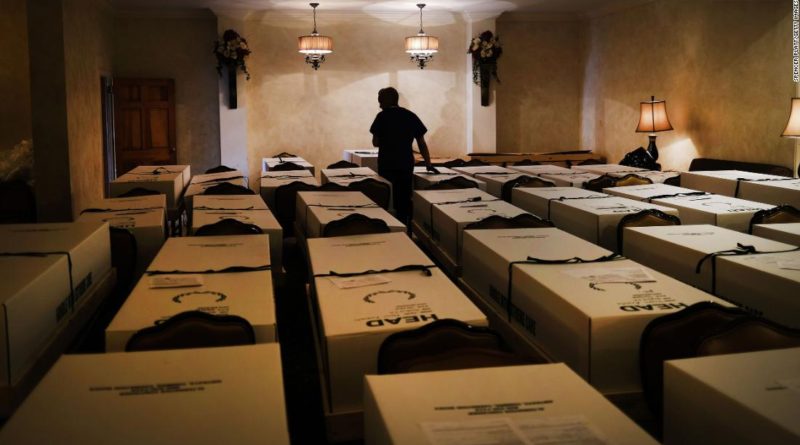Covid-19: How Americans can help prevent another 100,000 coronavirus deaths
But there are ways to help minimize future tragedies. People should socialize outdoors as much as possible and wear masks, scientists say.
So those socializing with friends outdoors should still stay at least 6 feet apart, said Erin Bromage, associate professor of biology at the University of Massachusetts Dartmouth.
“As long as you’ve got that 6 feet of distance and you’ve got the air blowing and you just are enjoying each other’s company, then 6 feet is fine,” Bromage said. “If you’re exercising and huffing and puffing away from 6 feet, I would get a little further apart.”
“If you put a mask on when outside [while] spending an extended period of time with a friend or somebody, masks help,” Bromage said.
“But now we’re getting better masks coming out from just local manufacturers that catch more of those respiratory emissions, which then lowers the amount of virus in the air, which just makes it safer.”
If you’re interacting with someone who’s more vulnerable to severe complications from Covid-19, Bromage advises having “a better quality mask on both you and them.”
6 feet of distance may not be enough, experts warn
In a commentary published in the journal Science, the experts highlighted the importance of masks and regular, widespread testing.
They pointed to places such as Singapore, Hong Kong and Taiwan, where mask wearing is universal and the virus has been controlled.
“Evidence suggests that [the novel coronavirus] is silently spreading in aerosols exhaled by highly contagious infected individuals with no symptoms,” wrote Chia Wang of National Sun Yat-sen University in Taiwan, and Kimberly Prather and Dr. Robert Schooley of the University of California, San Diego.
“Increasing evidence for [the coronavirus] suggests the six-foot WHO recommendation is likely not enough under many indoor conditions where aerosols can remain airborne for hours, accumulate over time and follow air flows over distances farther than six feet,” they wrote.
The three experts are specialists in chemistry and infectious diseases. They said aerosols from breathing and speaking can accumulate and remain infectious in indoor air for hours, and can be easily inhaled into the lungs.
That makes wearing masks all the more essential, they said, even when people are keeping their distance.
The US Centers for Disease Control and Prevention has said respiratory droplets produced when a person coughs or sneezes “can land in the mouths or noses of people who are nearby or possibly be inhaled into the lungs.”
Transmission is more likely when people are in close contact with one another, or “within about 6 feet,” the CDC said.
While health officials have focused on those three droplets, the three experts said “a large proportion” of the spread of coronavirus disease appears to be occurring through airborne transmission of aerosols produced by asymptomatic people during breathing and speaking.
Change of behavior is more crucial than a vaccine
The US did not have to lose 100,000 people in four months, according to an expert on viruses and biotechnology.
Better preparation and guidance could have helped lower the death toll, said Dr. William Haseltine, president of the think tank ACCESS Health International.
“We already know how to control the virus in a big population. It can be done through human behavior,” the former professor at Harvard Medical School said.
Experts had worked with the US Department of Defense and Homeland Security to plan and protect the country from bioterrorism, as well as from threats like the coronavirus.
“It was totally predictable that another coronavirus was on its way,” Haseltine said. “The mechanism exists, the stockpile, the drugs,” he said. “There was a hole in our safety net.”
China, New Zealand, and Australia have effectively dealt with coronavirus outbreaks, bringing their cases down through testing, contact tracing and isolation, Haseltine said.
The key to their success was behavior change without the benefit of a vaccine or effective drug.
States are seeing up and down trends in new cases
Some parts of the country are reporting fewer new cases each day, but others are seeing the opposite.
Washington, DC will move Friday into Phase 1 of reopening after it had a 14-day decline in cases of coronavirus community spread, Mayor Muriel Bowser said.
But as of Wednesday, there were 14 states in which the numbers of new cases each day were still trending upward.
Mississippi Gov. Tate Reeves warned residents to stay vigilant because the state is still seeing a steady number of cases.
California became the fourth state Wednesday with more than 100,000 cases. New York, New Jersey and Illinois were the first three to reach the milestone.
CNN’s Jamie Gumbrecht, Maggie Fox, Steve Almasy and Jay Croft contributed to this report








